-
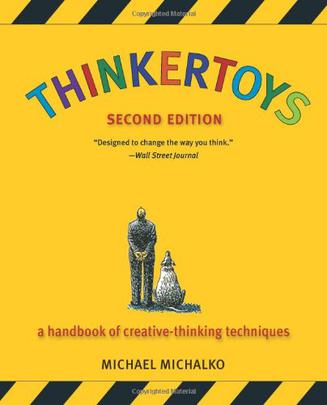
Thinkertoys
In hindsight, every great idea seems obvious. But how can you be the person who comes up with those ideas? In this revised and expanded edition of his groundbreaking THINKERTOYS, creativity expert Michael Michalko reveals life-changing tools that will help you think like a genius. From the linear to the intuitive, this comprehensive handbook details ingenious creative-thinking techniques for approaching problems in unconventional ways. Through fun and thought-provoking exercises, you'll learn how to create original ideas that will improve your personal life and your business life. Michalko's techniques show you how to look at the same information as everyone else and see something different. With hundreds of hints, tricks, tips, tales, and puzzles, THINKERTOYS will open your mind to a world of innovative solutions to everyday and not-so-everyday problems. Reviews:"Designed to change the way you think."--Wall Street Journal"Shows you how to expand your imagination."--Newsweek"A special find. Period."--Executive Edge"A must-have book in any business setting."--Women in Business -
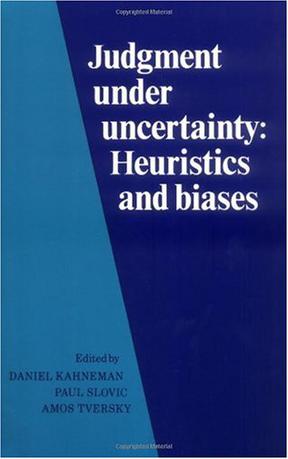
Judgment under Uncertainty
The thirty-five chapters in this book describe various judgmental heuristics and the biases they produce, not only in laboratory experiments but in important social, medical, and political situations as well. Individual chapters discuss the representativeness and availability heuristics, problems in judging covariation and control, overconfidence, multistage inference, social perception, medical diagnosis, risk perception, and methods for correcting and improving judgments under uncertainty. About half of the chapters are edited versions of classic articles; the remaining chapters are newly written for this book. Most review multiple studies or entire subareas of research and application rather than describing single experimental studies. This book will be useful to a wide range of students and researchers, as well as to decision makers seeking to gain insight into their judgments and to improve them. -
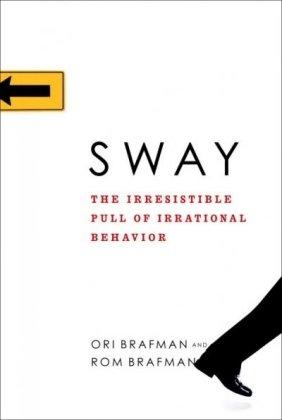
Sway
A fascinating journey into the hidden psychological influences that derail our decision-making, Sway will change the way you think about the way you think. Why is it so difficult to sell a plummeting stock or end a doomed relationship? Why do we listen to advice just because it came from someone “important”? Why are we more likely to fall in love when there’s danger involved? In Sway , renowned organizational thinker Ori Brafman and his brother, psychologist Rom Brafman, answer all these questions and more. Drawing on cutting-edge research from the fields of social psychology, behavioral economics, and organizational behavior, Sway reveals dynamic forces that influence every aspect of our personal and business lives, including loss aversion (our tendency to go to great lengths to avoid perceived losses), the diagnosis bias (our inability to reevaluate our initial diagnosis of a person or situation), and the “chameleon effect” (our tendency to take on characteristics that have been arbitrarily assigned to us). Sway introduces us to the Harvard Business School professor who got his students to pay $204 for a $20 bill, the head of airline safety whose disregard for his years of training led to the transformation of an entire industry, and the football coach who turned conventional strategy on its head to lead his team to victory. We also learn the curse of the NBA draft, discover why interviews are a terrible way to gauge future job performance, and go inside a session with the Supreme Court to see how the world’s most powerful justices avoid the dangers of group dynamics. Every once in a while, a book comes along that not only challenges our views of the world but changes the way we think. In Sway, Ori and Rom Brafman not only uncover rational explanations for a wide variety of irrational behaviors but also point readers toward ways to avoid succumbing to their pull. -
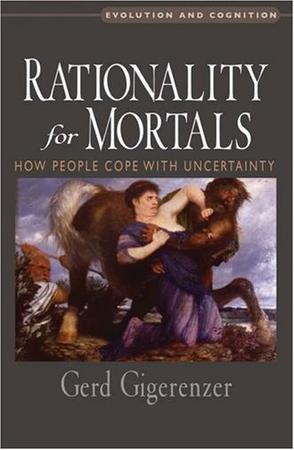
Rationality for Mortals
Gerd Gigerenzer's influential work examines the rationality of individuals not from the perspective of logic or probability, but from the point of view of adaptation to the real world of human behavior and interaction with the environment. Seen from this perspective, human behavior is more rational than it might otherwise appear. This work is extremely influential and has spawned an entire research program. This volume (which follows on a previous collection, Adaptive Thinking, also published by OUP) collects his most recent articles, looking at how people use "fast and frugal heuristics" to calculate probability and risk and make decisions. It includes a newly writen, substantial introduction, and the articles have been revised and updated where appropriate. This volume should appeal, like the earlier volumes, to a broad mixture of cognitive psychologists, philosophers, economists, and others who study decision making. -
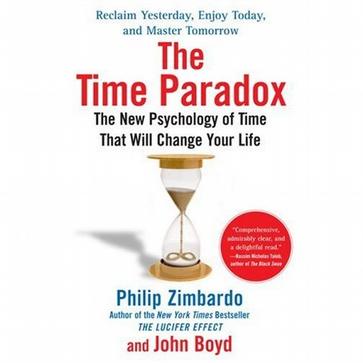
The Time Paradox
From Publishers Weekly Time is our most valuable possession: we are obsessed with schedules and multitasking to save time, say the authors of this insightful study of the importance of time in our lives. Yet people spend time less wisely than money. Zimbardo (The Lucifer Effect), professor emeritus of psychology at Stanford, and Boyd, research director for Yahoo!, draw on their two decades of research to explain why people devalue time. They blend scientific results into a straightforward narrative exploring various past-, present- and future-oriented ways of perceiving time and argue against becoming imprisoned or obsessed by any one of these. Zimbardo and Boyd have cogent insight into all of time's elements and show how they can be used for success, better health and greater fulfillment. For instance, understanding the role of time in investment can lead to wiser financial decisions, and a relationship will not work if one partner is focused on today's pleasure while the other wants to plan for the future. This is a compelling and practical primer (filled with quizzes and tests) on making every moment count. (Aug. 5) Review "If you are a decision maker, then you need to read this book. It informs about the central problem of how to discriminate between immediate rewards and future payoffs. The Time Paradox is comprehensive, admirably clear, and a delightful read."-- Nassim Nicholas Taleb, author of The Black Swan "The Time Paradox explores a very important topic from a fresh, practical, and entertaining perspective. Since time is limited for all of us, this book is well worth your time."-- Daniel Amen, M.D., author of Change Your Brain, Change Your Life and Healing the Hardware of Your Soul "The Time Paradox reveals how to better use your most irreplaceable resource, based on solid science and timeless wisdom."-- Martin Seligman, author of Authentic Happiness "Informed by the world's foremost expert on the psychology of time, The Time Paradox combines solid science, compelling stories, and crisp prose to illuminate how time, like the oxygen we breathe, pervades every aspect of our lives. Reading this book will yield insights into your own motivation and behavior and help you be happier, healthier, and more successful. It will also help you understand the source of many of the world's greatest triumphs and most pressing problems -- from terrorism to homelessness, from religion to love, from the successes and failures of CEOs to those of marriages. Zimbardo and Boyd have hit a home run."-- Sonja Lyubomirsky, author of The How of Happiness "Phil Zimbardo, a master at making complex ideas and discoveries in psychology, including his own, not only intelligible but fun and personally relevant for nonspecialists, has done it again, this time with the fascinating topic of time perspective. Bravo!"-- Walter Mischel, Ph.D., Columbia University Niven Professor of Humane Letters in Psychology -
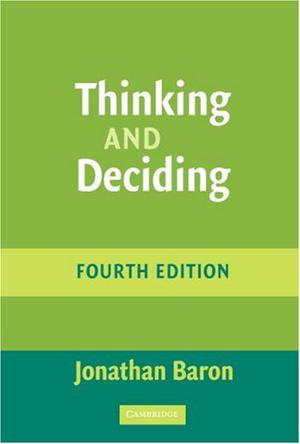
Thinking and Deciding
Beginning with its first edition and through subsequent editions, Thinking and Deciding has established itself as the required text and important reference work for students and scholars of human cognition and rationality. In this, the fourth edition, Jonathan Baron retains the comprehensive attention to the key questions addressed in the previous editions - How should we think? What, if anything, keeps us from thinking that way? How can we improve our thinking and decision making? - and his expanded treatment of topics such as risk, utilitarianism, Baye's theorem, and moral thinking. With the student in mind, the fourth edition emphasises the development of an understanding of the fundamental concepts in judgement and decision making. This book is essential reading for students and scholars in judgement and decision making and related fields, including psychology, economics, law, medicine, and business.